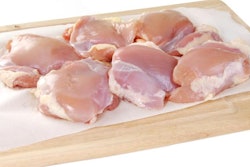
Brazilian poultry meat exports are forecast to rise by 1 percent this year, as the industry regains ground lost as a result of Operation Weak Flesh, which alleged fraud and the sale of meat unfit for human consumption.
But recovering from the “unprecedented image crisis,” which saw losses for the pig and poultry industries reach US$40 million within a week of the news breaking, is taking time. Although poultry meat exports are rising month by month, figures for June this year show volumes were still almost 10 percent below those of June 2016.
Yet a steady recovery of lost ground is occurring.
According to the Brazilian pig and poultry meat industry association, ABPA, June’s exports were 6.2 percent higher than those recorded in May, and 15.1 higher than in April, immediately after the scandal hit.
It goes on to say that the figure for June would have been higher had it not been for heavy rain causing a partial closure of ports in the south of the country.
The recovery in pig meat exports may have been slightly stronger than that of poultry meat shipments, but poultry meat exports are now “following a pattern above the general average of 2016” and, of the embargoes that are still in place, only four relate to plants producing pig and poultry meat.
Operation Weak Flesh
The findings of Operation Weak Flesh, conducted by the country’s federal police, first became public in mid-March, and included allegations that, across the meat industries, Brazil had been selling substandard meat and that the meat inspection service was corrupt.
Brazil’s Ministry of Agriculture moved quickly to investigate the allegations, launching its own task force of 250 inspectors to look at containers of already processed meat, slaughterhouses and to investigate the meat inspection service itself.
It found that, where problems existed, they were administrative rather than quality or food-safety related, and that rather than malpractice being common across the meat inspection service, the problems identified related to a small number of individuals, not the inspection service as a whole.
Secretary of Animal Health Luis Pacifici Rangel said: “What happened was the poor conduct of a minority of employees. The problem was isolated.” Brazil did not have sanitary problems in its meat industry, he said.
Nevertheless, the damage had been done and, by the end of March, 20 markets had completely suspended imports of Brazilian meat and more than double that number has introduced partial bans.
Rebuilding trust
Trade missions and other government and industry initiatives have now largely addressed concerns in export markets, and the backlog of meat that built up as a result of the various embargoes has been largely absorbed by international markets.
Emphasizing the controls that are carried out on Brazilian meat production, ABPA Executive President Francisco Turra said: “Our system is audited by importing countries and by various private bodies, and more than 1,000 visits were carried out in 2016.”
As of July, most restrictions on Brazilian product had been lifted, however, 21 plants were still excluded from the market, four of which were poultry or pig meat processors. Those embargoes still in place accounted for 0.4 percent of poultry meat exports and 0.2 percent of pig meat exports.
Several factors have contributed to the recovery of Brazilian poultry industry in global markets.
In addition to government and industry efforts to address the effects of Operation Weak Flesh, outbreaks of avian influenza around the world, including in rival exporting countries, have helped to boost demand for Brazilian poultry meat and lifted prices. Additionally, improved supplies of corn and soya have helped to make Brazilian products more competitive.
There remain, however, challenges on the horizon. Not only are there several plants that still need to re-enter the export market, but a strike by federal inspectors does the industry few favors coming on the heels of concerns about the quality of the country’s inspection services.
Prior to Operation Weak Flesh, Brazilian poultry meat exports were in positive territory, with sales during the first three months of this year ahead of those of the first quarter of 2016. While the industry expects to end the year once again in positive territory, figures for the first half show that sales by volume fell from 2.27 million tons last year, to 2.22 million tons this year, a decrease of 6.4 percent, although by value sales were 5.9 percent higher.

Operation Weak Flesh alleged that substandard product was being sold across meat types, not only to export markets but also within the country. | Yastremska, Bigstockphoto.com


















